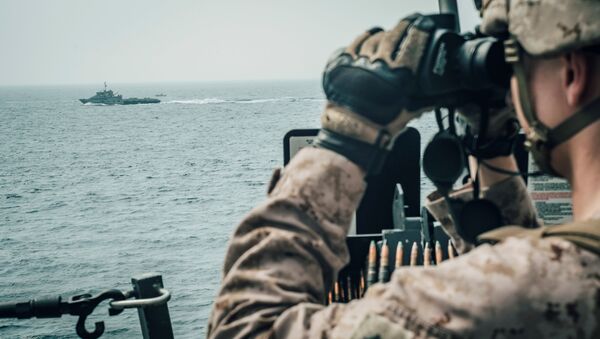US President Donald Trump’s decision to pull out of the 2015 Iran nuclear deal, the Joint Comprehensive Plan of Action (JCPOA), has led to a resumption of sanctions and an increase in hostility between the US and Iran. Though the US was the only country to withdraw from the agreement, Washington now wants Paris, London and Berlin to assist in efforts to “combat Iranian aggression” in the Strait of Hormuz, according to the US Embassy in Berlin.
Despite the UK-US attempt to sway the other two nations in favor of their tanker escort operation, both Germany and France appear reticent to muddy the trade waters between themselves and Iran.
“We are in close consultation with France and the UK. Participation in the US strategy of 'maximum pressure' is ruled out for us,” the German Foreign Ministry told Sputnik Tuesday.
Mohammad Marandi, an expert on American studies and postcolonial literature who teaches at the University of Tehran, joined the hosts of Radio Sputnik’s Loud and Clear on Tuesday to discuss the US’ call and the lackluster response and offer insight on what they may mean concerning how the US stands as a global power.
“Back [in the 1980s], the United States was in a much stronger position militarily, economically. Iran was in a very weak position. It had been fighting a war for six, seven years,” Marandi told Loud and Clear hosts Brian Becker and John Kiriakou. “After the revolution, the country didn't have a very advanced military defense capability or military defense industry. And Iran was isolated, both regionally and globally.”
Marandi highlighted that the Iran of 2019 is very different than that of the 1980s and now has a “very developed defense capability.” He said this was made apparent in the June 20 downing of the US’ $200 million RQ-4A Global Hawk BAMS-D surveillance drone by the Islamic Revolutionary Guard Corps.
“We see that Iran has a very large regional coalition and alliance built which includes Yemen, Syria, Iraq, Lebanon, Afghanistan,” Marandi said. Additionally, other Middle Eastern countries such as Turkey favor Iran over the US.
Meanwhile, the professor noted, the United States’ allies in the region, such as “Saudi Arabia, the Emirates and the Israeli regime,” are more isolated geographically.
“I don’t think the United States, even under Obama, ever planned to abide by its commitments within the framework of the JCPOA. They were hoping to have Iran carry out its commitments, and they would, piece-by-piece, dismantle the deal and try to keep Iran within the framework of the deal.”
However, now the agreement is falling apart, while the US has also managed to isolate itself politically, making it difficult to form a coalition against Iran.
“The only way in which the United States is able to enforce its sanctions against Iran is through sheer bullying. By threatening Korea, by threatening Japan, by telling the Chinese that they’re not allowed to trade with Iran.”


